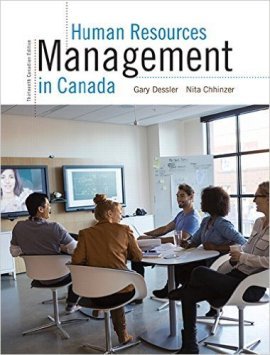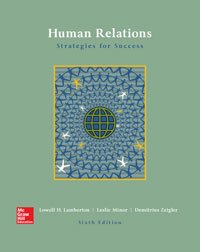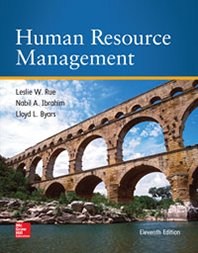Human Resource Management V2.0 by Laura Portolese – Test Bank
Chapter 14
International HRM
True/False Questions
Section One
- A multinational company produces its goods domestically and then sells them overseas.
False; Easy
- A transnational company is a complex organization in which much of the decision making, research and development, and marketing are controlled by the individual foreign market.
True; Easy
- A trade agreement is an agreement between two or more countries to reduce barriers to trade.
True; Easy
- Collective societies are based on cohesive groups, whether it be family groups or work groups.
True; Easy
- Power distance refers to the manner in which a society tolerates uncertainty.
False; Easy
- A short-term orientation would focus on future rewards for work now, persistence, and the ordering of relationships by status.
False; Easy
- Norms are the shared expectations about what is considered correct and normal behavior.
True; Easy
- Material culture can range from symbolic items, such as a crucifix, to items of daily use.
True; Easy
Section Two
- In a home-country national strategy, people who were born in the country in which the business is operating are employed.
False; Easy
- A third-country national strategy means to employ people from an entirely different country from the home country and host country.
True; Easy
- By using a third-country national strategy, the language barrier in conducting business overseas is completely eliminated.
False; Easy
- In the adaptation phase of adjustment that an expatriate goes through, there is a feeling of excitement about the new surroundings.
False; Easy
- Biculturalism is an adjustment phase wherein the expatriate embraces the new culture and begins to appreciate his/her old life at home as much as the new life overseas.
True; Easy
- The main reason why companies use third-country nationals as a staffing strategy is the ability of such a candidate to represent the company’s interests and transfer corporate technology and competencies.
True; Easy
Section Three
- An effective expatriate adjusts solely from the physiological perspective.
False; Easy
- Expatriation is the process of helping employees make the transition to their home country.
False; Easy
- A localized compensation strategy is a pay banding system based on regions.
True; Easy
- An overseas premium is an extra amount paid to an expatriate for accepting an overseas assignment.
True; Easy
- The advantage to codetermination is the sharing of power throughout all levels of the organization.
True; Easy
- Foreign tax credit is a mechanism which requires the expatriate to file tax returns in the home country as well as in the host country.
False; Easy
Multiple Choice questions
Section One
- _____ occurs when a business relocates or moves some or part of its operations to another country.
- Licensing
- Offshoring
- Franchising
- Insourcing
- Greenfield venturing
b; Easy
- _____ involves contracting with another company to perform some business-related task.
- Franchising
- Greenfield venturing
- Co-working
- Outsourcing
- Licensing
d; Easy
- A company decides to contract its payroll services to a local financial organization. This is an example of _____.
- offshoring
- co-working
- outsourcing
- licensing
- franchising
c; Easy











Reviews
There are no reviews yet.